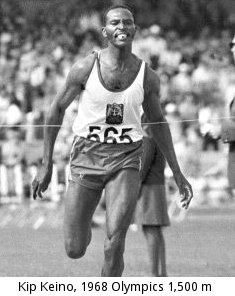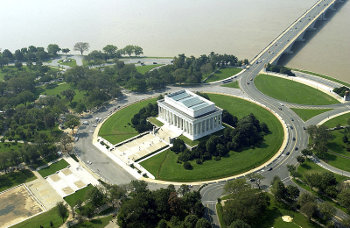
During the 1960 Olympiad in Rome, an obscure Ethiopian named, Abebe Bikila, captured gold in the men’s marathon. The track-and-field world responded with collective incredulity: “What on earth is an Ethiopian doing in a marathon?” At that time the world’s premiere long-distance runners hailed from the cool climates of Northern Europe—the British Isles, Scandanavia, the Soviet Union. Bikila’s victory was widely dismissed as a fluke.
Bikila’s victory was no fluke. It turned out to be the spark that ignited a revolution. Just eight years later, no less than nine east Africans won medals in long distance races at the Olympics in Mexico City. Three Kenyans captured gold at those games, including a most inspiring victory by Kipchoge Keino.
Kip Keino arrived at the games suffering from a gall bladder infection. He ran anyway. Keino led the 10,000 meter race with only two laps to go when he collapsed and was disqualified. Two days later Mr. Keino ran again and won a silver medal in the 5,000 meter race.
With his gall bladder infection raging out of control, doctors sidelined Keino for the 1,500 meter race in which he had hoped to compete. Convalescing in the athlete’s village, Keino decided he would rather die than disappoint his fellow Kenyans. The fire to run burned too hot in his soul to quench. He hailed a cab and set out for the Olympic stadium. A mile from his destination, his taxi was stopped in its tracks by a gnarly traffic jam. In jeopardy of missing the race, Keino jumped out of his cab and jogged past stalled commuters to the stadium. He arrived in time and lined up against then world-record holder, Jim Ryun. Ryun had not lost a 1,500 meter race in over three years. Kip Keino won the race by 20 meters! [Ed.: Watch Keino’s victory here.]
The thunderous response that rocked Mexico’s Olympic stadium did not begin to compare with the fire Keino’s victory ignited in his fledgling and impoverished homeland of Kenya—particularly among Keino’s own Kalenjin tribe. Since that day, long-distance running has been a path to glory among the Kalenjin.
According to researcher, John Manners, 75 per cent of Kenya’s top runners hail from this single tribe. From 1987-1997 Kalenjin runners captured 40 per cent of the top international honors in men’s long distance running—including placing first, second, and twelfth in the Boston Marathon in 1996. “I contend” says Manners, “that this record marks the greatest geographic concentration of achievement in the annals of sport” (www.pewfellowships.org).
To this day a major long-distance race anywhere on earth will invariably find an east-African—if not a Kenyan—contending for the prize. Following the inspiring lead of Bikila, Keino and others have led the underdeveloped and thinly populated nation of Kenya to world-dominance in long-distance running.

 Republished with permission from
Republished with permission from 
 The Lincoln memorial in Washington D.C. is hallowed ground in my book. I stood at this sacred spot in 2005 and was deeply moved.
The Lincoln memorial in Washington D.C. is hallowed ground in my book. I stood at this sacred spot in 2005 and was deeply moved.
Discussion